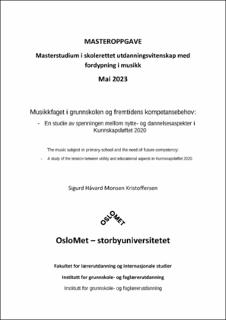| dc.description.abstract | Denne masteroppgavens problemstilling stiller spørsmålet: «Hvordan kan musikkfaget bidra til å utruste elevene i grunnskolen til å imøtekomme fremtidens kompetansebehov?». I dette spørsmålet ligger det en ladning i ordene «kan» og «bidra». For kan egentlig musikkfaget utruste elevene med fremtidens kompetanser? Og hvordan skal musikkfaget i så fall bidra til det? Bakgrunnen for oppgaven er undersøkelser av de bakenforliggende utredningene til Ludvigsen-utvalget og Meld. St. 28 (2015 – 2016) som førte til fagfornyelsen og læreplanverket LK20. NOU2014:7 og NOU2015:8 viser tydelig påvirkning fra OECD og andre internasjonale aktører. Et samfunnsøkonomisk perspektiv for utformingen av LK20 står sentralt i denne oppgaven. I møte med den norske stats grunnskoles verdier oppstår det en spenning mellom nytte- og dannelsesaspekter. Øivind Varkøy m.fl. har stilt spørsmålet om musikkfaget kun er et middel som et samfunnsnyttig mål, og slik sett et offer for instrumentell tenkning. Hvordan dette gjenspeiler seg i LK20 vil hjelpe meg å svare på denne oppgavens problemstilling. Ved å gjøre en litteraturstudie har denne teoretiske oppgaven blitt utformet ved at jeg har prøvd å følge teorier tilbake til sin opprinnelse og tatt utgangspunkt i funn gjort i litteraturen. Teorigrunnlaget for oppgaven er i hovedsak OECDs forskning, dannelsesteorier med Klafki i spissen, og Varkøy sitt syn på musikkfaget. Ved å diskutere problemstillingen i lys av disse teoriene, forsøker oppgaven å vise et bredt og helhetlig perspektiv på emnet. I tillegg diskuteres dette kontinuerlig opp mot LK20. På denne måten forsøker denne teoretiske oppgaven å bidra til ny innsikt og kunnskap om musikkfagets rolle i utdanning og dannelse, i et fremtidsperspektiv. Oppgaven har ingen endelig konklusjon, men avsluttes med antydninger om at musikkfaget kan bidra til utrustelse av fremtidens kompetanser ved å være et instrumentelt middel. 21st century skills drar stor nytte av musikkfagets egenart og verdi. Kompetanser som samarbeid og kreativitet er sentralt her. Videre påpeker oppgaven at dannelse, slik det er beskrevet i overordnet del av LK20 og av dannelsesteoretikerne, ikke lar seg gjennomføre innenfor de rammene som er satt. Det kan derfor være behov for en redefinering av skolens formål for dannelse og hvordan dette kan integreres i grunnopplæringen, skolefagene, og i musikkfaget spesielt.
This master's thesis poses the question: "How can music education contribute to equipping primary school students to meet future competency needs?". Within this question lies a charge in the words "can" and "contribute". Can music education actually equip students with future competencies? And how should music education contribute to that? The background for this thesis is research into the formation of Ludvigsen committee and Meld. St. 28 (2015-2016), which led to the curriculum renewal of LK20. NOU2014:7 and NOU2015:8 clearly show influence from the OECD and other international actors. A socio-economic perspective for the design of LK20 is central to this thesis. In meeting the values of the Norwegian state's primary school system, there is a tension between utility and formation aspects. Øivind Varkøy and others have questioned whether music education is merely a means to a socially useful end, and thus a victim of instrumental thinking. How this is reflected in LK20 will help me answer this thesis question. Through a literature review, this theoretical thesis has been formulated by attempting to trace theories back to their origins and drawing on findings from the literature. The theoretical foundation for the thesis is primarily OECD research, formation theories with Klafki at the forefront, and Varkøy's view on music education. By discussing the question in light of these theories, the thesis attempts to present a broad and comprehensive perspective on the topic. In addition, this is continuously discussed in relation to LK20. In this way, this theoretical thesis attempts to contribute new insight and knowledge about the role of music education in education and formation, in a future perspective. The thesis has no final conclusion but ends with suggestions that music education can contribute to equipping future competencies by being an instrumental means. 21st-century skills benefit greatly from the uniqueness and value of music education. Competencies such as collaboration and creativity are central here. Furthermore, the thesis notes that formation, as described in the overarching principles of LK20 and by formation theorists, cannot be realized within the set frameworks. Therefore, there may be a need to redefine the school's goals for formation and how this can be integrated into primary education, school subjects, and music education in particular. | en_US |
